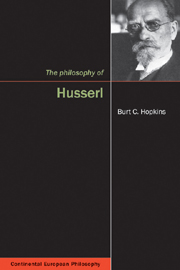Book contents
- Frontmatter
- Contents
- Acknowledgements
- Abbreviations
- Prolegomenon: Husserl's turn to history and pure phenomenology
- I Plato's and Aristotle's theory of eidē
- II From descriptive psychology to transcendentally pure phenomenology
- III From the phenomenology of transcendental consciousness to that of monadological intersubjectivity
- 9 Phenomenological philosophy as transcendental idealism
- 10 The intersubjective foundation of transcendental idealism: the immanent transcendency of the world's objectivity
- IV From monadological intersubjectivity to the historical a priori constitutive of all meaning
- V The unwarranted historical presuppositions guiding the fundamental ontological and deconstructive criticisms of transcendental philosophy
- Epilogue: Transcendental-phenomenological criticism of the criticism of phenomenological cognition
- Coda: Phenomenological self-responsibility and the singularity of transcendental philosophy
- Notes
- Bibliography
- Index
9 - Phenomenological philosophy as transcendental idealism
from III - From the phenomenology of transcendental consciousness to that of monadological intersubjectivity
- Frontmatter
- Contents
- Acknowledgements
- Abbreviations
- Prolegomenon: Husserl's turn to history and pure phenomenology
- I Plato's and Aristotle's theory of eidē
- II From descriptive psychology to transcendentally pure phenomenology
- III From the phenomenology of transcendental consciousness to that of monadological intersubjectivity
- 9 Phenomenological philosophy as transcendental idealism
- 10 The intersubjective foundation of transcendental idealism: the immanent transcendency of the world's objectivity
- IV From monadological intersubjectivity to the historical a priori constitutive of all meaning
- V The unwarranted historical presuppositions guiding the fundamental ontological and deconstructive criticisms of transcendental philosophy
- Epilogue: Transcendental-phenomenological criticism of the criticism of phenomenological cognition
- Coda: Phenomenological self-responsibility and the singularity of transcendental philosophy
- Notes
- Bibliography
- Index
Summary
Phenomenology as transcendental theory of knowledge: criticism of transcendental experience and knowledge
The third and next to last of the four stages in the development of Husserl's phenomenology, as previously mentioned, has two guiding clues: the Cartesian-inspired idea of first philosophy and that of the function of the passive constitution of meanings and their hidden intentional accomplishments in the constitution characteristic of all meaning and being. Under the guidance of the idea of first philosophy Husserl reinterprets the very meaning of transcendentally pure phenomenology as transcendental philosophy. Phenomenological science, as the science devoted to the concrete explication of transcendental consciousness and the fixing of the eidetic laws governing its absolute being, is now understood as having an intrinsically philosophical meaning. The third stage of Husserl's phenomenology thus overcomes the hesitation of its second stage to characterize the science of phenomenology as a science that is necessarily philosophical, as opposed to an eidetic science whose cognitions possess a philosophical significance and are therefore of some service to philosophy. What allows Husserl to interpret transcendentally pure phenomenology's proper meaning as transcendental philosophy is the phenomenological idealism that he now identifies with phenomenology's innermost self-understanding. It is this conception of a phenomenological science that, as Husserl puts it, is “destined to become philosophy” (CM, 67). It is so destined in so far as a phenomenological philosophy and phenomenological idealism are the “only possibilities” (CM, 120) from which is constituted “a philosophy as common to ‘all of us’ who mediate together – ideally, a single philosophia perennis” (ibid.).
- Type
- Chapter
- Information
- The Philosophy of Husserl , pp. 148 - 155Publisher: Acumen PublishingPrint publication year: 2010

